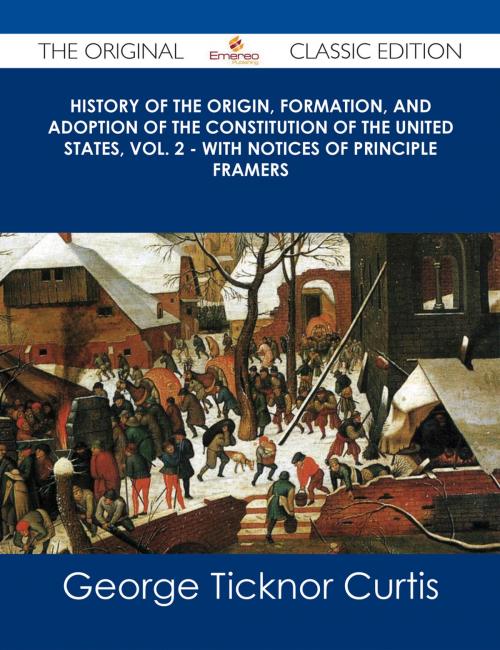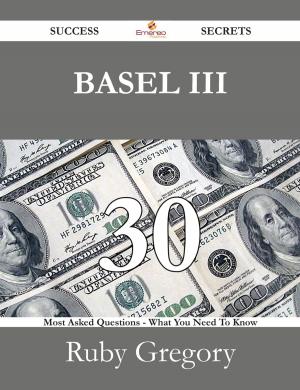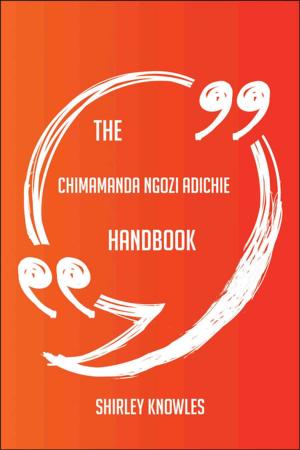History of the Origin, Formation, and Adoption of the Constitution of the United States, Vol. 2 - with notices of principle framers - The Original Classic Edition
Nonfiction, Reference & Language, Reference, Fiction & Literature| Author: | George Ticknor Curtis | ISBN: | 9781486445844 |
| Publisher: | Emereo Publishing | Publication: | March 18, 2013 |
| Imprint: | Emereo Publishing | Language: | English |
| Author: | George Ticknor Curtis |
| ISBN: | 9781486445844 |
| Publisher: | Emereo Publishing |
| Publication: | March 18, 2013 |
| Imprint: | Emereo Publishing |
| Language: | English |
Finally available, a high quality book of the original classic edition of History of the Origin, Formation, and Adoption of the Constitution of the United States, Vol. 2 - with notices of principle framers. It was previously published by other bona fide publishers, and is now, after many years, back in print.
This is a new and freshly published edition of this culturally important work by George Ticknor Curtis, which is now, at last, again available to you.
Get the PDF and EPUB NOW as well. Included in your purchase you have History of the Origin, Formation, and Adoption of the Constitution of the United States, Vol. 2 - with notices of principle framers in EPUB AND PDF format to read on any tablet, eReader, desktop, laptop or smartphone simultaneous - Get it NOW.
Enjoy this classic work today. These selected paragraphs distill the contents and give you a quick look inside History of the Origin, Formation, and Adoption of the Constitution of the United States, Vol. 2 - with notices of principle framers:
Look inside the book:
We have seen that the treaty of peace could not be executed; that the Confederation could do nothing to secure the republican governments of the States; that the commerce of the country could not be protected against the policy of foreign governments, constantly watching for advantages which the clashing interests of the different States at all times held out to them; and that, with the rule which required the assent of nine States to every important measure, it was possible for the Congress to refuse or neglect to do what it was of the last importance to the people of the United States they should do. ...That the construction of their powers by the latter class of the members of the Convention comported with the mere terms of the acts of the States, and with the general expectation, I have more than once intimated; but we shall see, as the experiment of framing the new system proceeded, that the views of the other class were equally correct; that the addition of further powers to the existing system of the Union would have left it as weak and inefficient as it had been before; and that what were universally regarded as the 'exigencies of the Union'—which was but another name for the wants of the States—could only be provided for by the creation of a different basis for the government. ...The answer made to this objection was, that although the States, in appointing their delegates to the Convention, had given them no express authority to change the principle of the existing constitution, yet that the Convention had been assembled at a great crisis in the affairs of the Union, as an experiment, to remedy the evils under which the country had long suffered from the defects of its general government; that whatever was necessary to the safety of the republic must, under such circumstances, be considered as within the implied powers of the Convention, especially as it was proposed to do nothing more than to recommend the changes which might be found necessary; and that although all might not assent to the changes that would be proposed, the dissentient States could not require the others to remain under a system that had completely failed, when they could form a new confederacy upon wiser and better principles.
Finally available, a high quality book of the original classic edition of History of the Origin, Formation, and Adoption of the Constitution of the United States, Vol. 2 - with notices of principle framers. It was previously published by other bona fide publishers, and is now, after many years, back in print.
This is a new and freshly published edition of this culturally important work by George Ticknor Curtis, which is now, at last, again available to you.
Get the PDF and EPUB NOW as well. Included in your purchase you have History of the Origin, Formation, and Adoption of the Constitution of the United States, Vol. 2 - with notices of principle framers in EPUB AND PDF format to read on any tablet, eReader, desktop, laptop or smartphone simultaneous - Get it NOW.
Enjoy this classic work today. These selected paragraphs distill the contents and give you a quick look inside History of the Origin, Formation, and Adoption of the Constitution of the United States, Vol. 2 - with notices of principle framers:
Look inside the book:
We have seen that the treaty of peace could not be executed; that the Confederation could do nothing to secure the republican governments of the States; that the commerce of the country could not be protected against the policy of foreign governments, constantly watching for advantages which the clashing interests of the different States at all times held out to them; and that, with the rule which required the assent of nine States to every important measure, it was possible for the Congress to refuse or neglect to do what it was of the last importance to the people of the United States they should do. ...That the construction of their powers by the latter class of the members of the Convention comported with the mere terms of the acts of the States, and with the general expectation, I have more than once intimated; but we shall see, as the experiment of framing the new system proceeded, that the views of the other class were equally correct; that the addition of further powers to the existing system of the Union would have left it as weak and inefficient as it had been before; and that what were universally regarded as the 'exigencies of the Union'—which was but another name for the wants of the States—could only be provided for by the creation of a different basis for the government. ...The answer made to this objection was, that although the States, in appointing their delegates to the Convention, had given them no express authority to change the principle of the existing constitution, yet that the Convention had been assembled at a great crisis in the affairs of the Union, as an experiment, to remedy the evils under which the country had long suffered from the defects of its general government; that whatever was necessary to the safety of the republic must, under such circumstances, be considered as within the implied powers of the Convention, especially as it was proposed to do nothing more than to recommend the changes which might be found necessary; and that although all might not assent to the changes that would be proposed, the dissentient States could not require the others to remain under a system that had completely failed, when they could form a new confederacy upon wiser and better principles.















